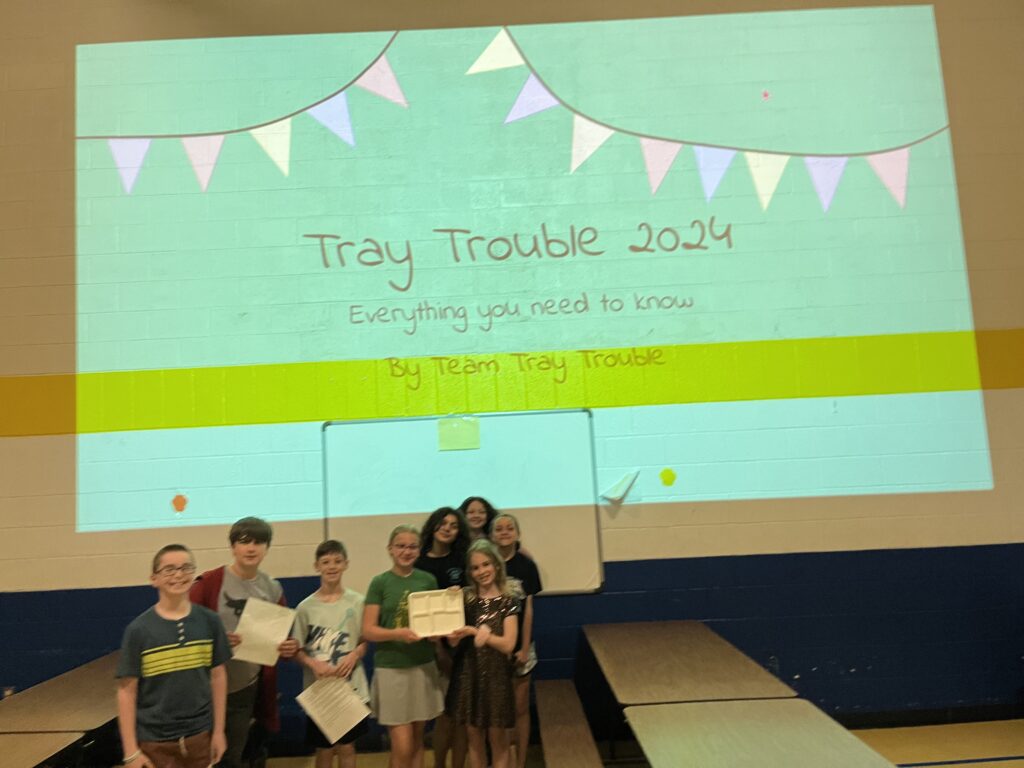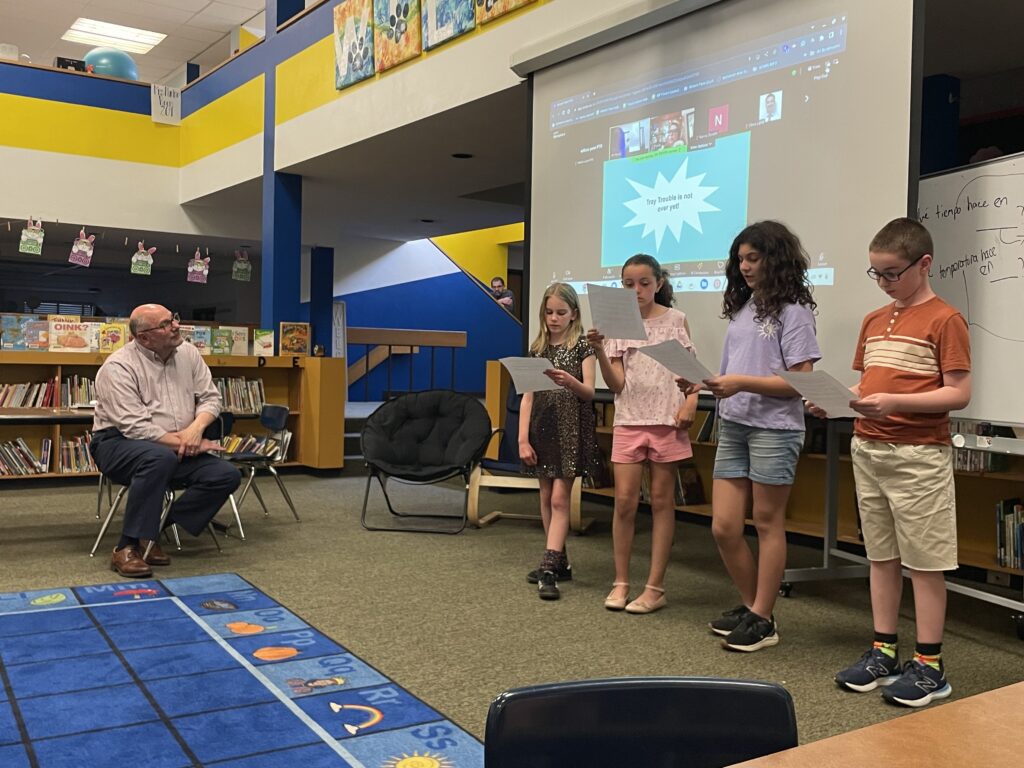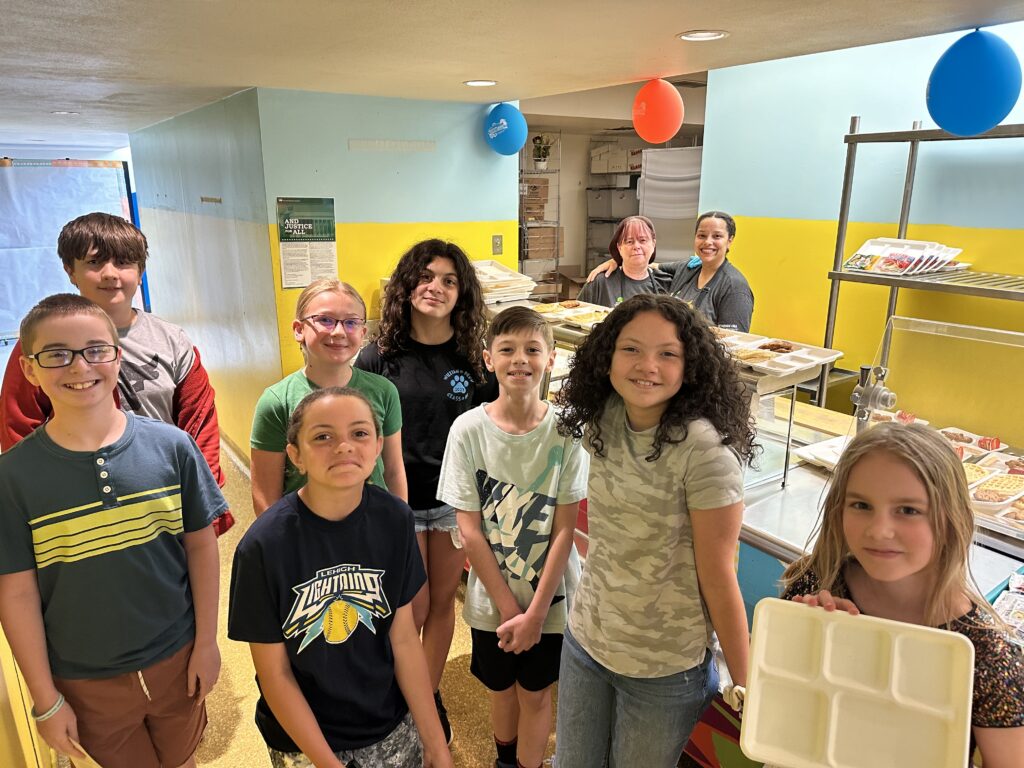It takes 500 years for a Styrofoam tray to break down. It took 3 years for a team of students at William Penn Elementary School in Bethlehem to replace their cafeteria’s Styrofoam trays with biodegradable ones.
 “Tray Trouble” is a dedicated group of 5th grade students who have been working to convince their school of the importance and feasibility of using more sustainable trays in the cafeteria. Team Tray Trouble includes Emeline, Mason M., Mason S., Maya, Skylar, Sophia, Tyrian, Wren, and advisor Ms. Ashley Schellhaas. When the members were in 2nd grade, Skylar was working on a project for which the class was asked to persuade someone to do something. “I decided to look at problems with our school and eventually came across the trays,” Skylar says. Other students who heard about this issue got on board, and Tray Trouble was born.
“Tray Trouble” is a dedicated group of 5th grade students who have been working to convince their school of the importance and feasibility of using more sustainable trays in the cafeteria. Team Tray Trouble includes Emeline, Mason M., Mason S., Maya, Skylar, Sophia, Tyrian, Wren, and advisor Ms. Ashley Schellhaas. When the members were in 2nd grade, Skylar was working on a project for which the class was asked to persuade someone to do something. “I decided to look at problems with our school and eventually came across the trays,” Skylar says. Other students who heard about this issue got on board, and Tray Trouble was born.
The group was shocked to learn that the trays they use for just minutes each day will remain in landfills or the environment for centuries. They calculated that their school uses about 5,500 trays a month, or 36,000 per year. The Styrofoam “can get into the water and it’ll add to the trash in the ocean and make it worse,” Tyrian explained. Talking to the students it is clear that they have become experts on the impacts of plastic waste and have lots of practice presenting these facts to others.
 Armed with this information and their determination to improve the situation, Tray Trouble went to work talking to their principal, dining services, the PTO, and others. Originally, the students proposed a switch to reusable trays and installation of a dishwasher, but high costs (over $30,000 for the initial purchase plus $12,000 per year afterwards) and planned demolition of the current school facility made that option impractical. Next, they researched compostable trays, but found that they would not be able to compost them on-site at the school. Finally, they settled on biodegradable trays.
Armed with this information and their determination to improve the situation, Tray Trouble went to work talking to their principal, dining services, the PTO, and others. Originally, the students proposed a switch to reusable trays and installation of a dishwasher, but high costs (over $30,000 for the initial purchase plus $12,000 per year afterwards) and planned demolition of the current school facility made that option impractical. Next, they researched compostable trays, but found that they would not be able to compost them on-site at the school. Finally, they settled on biodegradable trays.
Along the way, the group held fundraisers to support implementation of their solution. They sold snacks for Earth Day at lunch and at a movie night where they viewed Wall-E, and they offered a “buy-a-tray” option to parents who wanted to donate. Now they are trying to secure additional funds by applying for grants.
Tray Trouble’s efforts paid off on May 1, 2024, when the cafeteria started serving food on biodegradable trays purchased with the money they raised. “This is a phenomenal group of students that have worked really hard, and on May 1st we got to celebrate,” said Ms. Schellhaas.
Asked what advice they would have for other students who might want to make something similar happen at their school, the students emphasized the importance of patience and persistence. “It might take a while, and there’s a lot of trial and error. You might have to try different things, but it’s all worth it in the end,” Wren said. “Don’t give up,” Mason echoed. “When we were doing this I remember being told many times ‘no that’s not possible’.” No matter what, just “try to keep going,” Tyrian added. Tray Trouble serves as an inspiring example for other youth as well as adults of what can happen if you stick with something that really matters to you and keep trying until you find a solution that works.
Ms. Schellhaas says that this is the first group she has worked with in her 18 years of teaching that was created by students, and she emphasizes the group’s determination, dedication, and teamwork. “Working for three years on the same problem is very tiring,” she says, “but each core member refused to let a ‘no’ stop them.” The students have used their lunch and recess time to work on this project as well as occasionally meeting after school. Reflecting on her role as the adult advisor for this student-led project, Ms. Schellhaas says “working with students as an ‘equal contributor’ is a powerful method when the students possess the passion and capabilities this group has demonstrated. Children are underutilized when it comes to solving problems in and around our communities… Involving the young ensures our future’s success!” She also outlined the many varied skills students have gained through the project, including making slideshows, spreadsheets, QR codes, and their own “elevator speech,” presenting to adults and peers, planning events, research, and more!
As for what the future holds for the group? Tray Trouble’s eight members are headed to Northeast Middle School in the fall and plan to continue their work to reduce plastic and waste there. It seems safe to say that they are well prepared to accomplish whatever they set their minds to next.
Want to stay up to date on NNC’s CREATE Connections project to hear about other projects like Tray Trouble? Sign up for our newsletter here.
This blog post was prepared by the Nurture Nature Center under award NA23SEC0080002 from the Environmental Literacy Program of the National Oceanic and Atmospheric Administration (NOAA), U.S. Department of Commerce. The statements, findings, conclusions, and recommendations are those of the author(s) and do not necessarily reflect the views of NOAA or the U.S. Department of Commerce.

